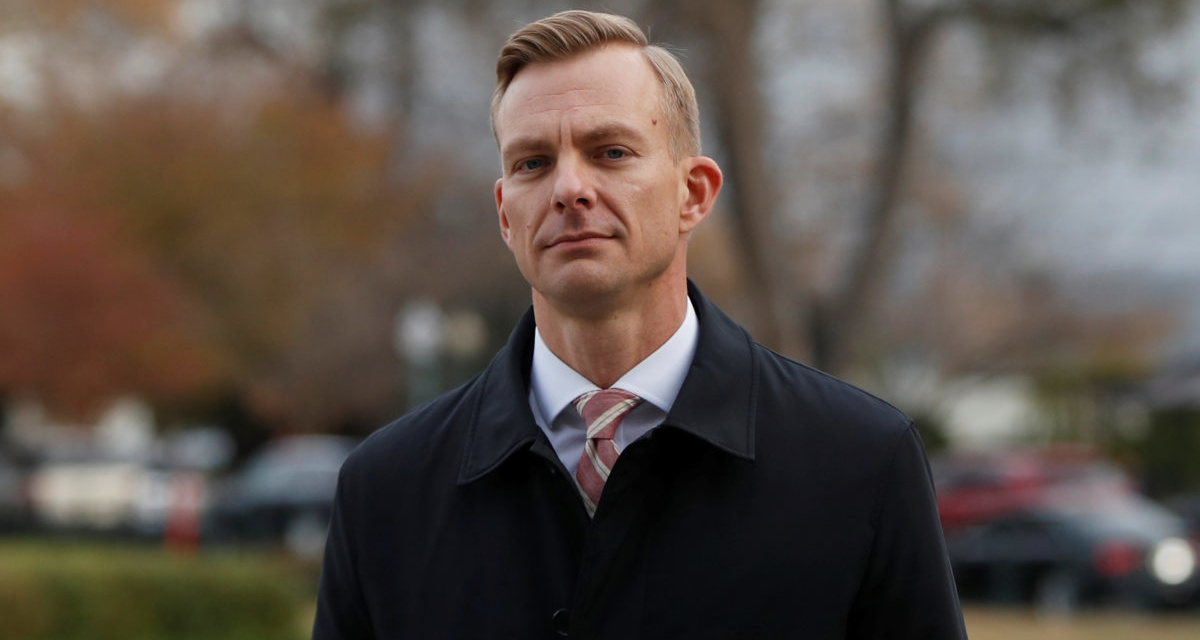David Holmes, senior diplomat at the US Embassy in Ukraine, arrives at the US Capitol for a closed-door deposition to the House Intelligence Committee, November 15, 2019 (Yara Nardi/Reuters)
David Holmes, a senior diplomat at the US Embassy in Kyiv, has reinforced evidence of Donald Trump’s link of military aid to Ukraine’s investigations to tarnish Presidential candidate Joe Biden and to cover up Russia’s interference in the 2016 US election.
The transcript of Holmes’ closed-door testimony to the House Intelligence Committee was released on Monday, and he is expected to testify publicly on Thursday.
Holmes told the Committee that Ukrainian officials “came to understand what was required” to get $391 million in military assistance — frozen by Trump days before a July 25 call with Ukrainian President Volodymyr Zelenskiy — and a Zelenskiy visit to the White House.
The diplomat added to a series of statements by current and former US officials tearing down Trump’s insistence that there was no “quid pro quo” for Kyiv’s announcement of the investigations, sought before, during, and after the July 25 call.
He said the Ukrainian officials viewed Trump’s attorney Rudy Giuliani, leading the campaign for the statement of investigations, “as an important representative of American interests”.
Read Transcript of Holmes Testimony
Holmes’ name surfaced earlier this month in testimony by William Taylor, the US chargé d’affaires in Kyiv, giving detail of the campaign by Trump and his attorney Rudy Giuliani, carried out by US Ambassador to the EU Gordon Sondland.
The day after the Trump-Zelenskiy call, Holmes overheard a mobile phone call between Trump and Sondland. Over an unsecured line, Trump asked about the status of “more investigations”. Afterwards, Sondland told Holmes and another Embassy staffer that “President Trump cares more about the investigations of Biden, which Giuliani was pressing for”, than he did about Ukraine.
See TrumpWatch, Day 1,031: Top Officials Further Tie Trump to Ukraine “Quid Pro Quo”
Diplomats “Shocked”
Holmes said he was “struck, in retrospect” by how much the Ukrainians “seemed to not raise” the issue of investigations “with the embassy personnel”. Instead, “they confined that to a different track” — the Trump-Giuliani channel including Sondland — in which [top Zelenskiy aide Andriy] Yermak was very prominent”.
The diplomat said Zelensky said there were “sensitive issues” that Trump brought up “three different times”, but declined to discuss them with Holmes: “He said, I would need to take them up in person with the President.”
Holmes said that, after hearing the Sondland-Trump call of July 26, he discussed it with Deputy Chief of Mission Kristina Kvien, who was “shocked” by the substance.
He said Sondland would frequently speak as if he were doing so on behalf of Trump, saying “things in meetings like, ‘I know the President would agree with what you just said’….He would portray himself as having knowledge, direct knowledge, of the president’s priorities and interests.”
Through Sondland and US envoy to Ukraine Kurt Volker, a statement was drafted for Zelenskiy to announce the investigations. The effort collapsed after revelations in early September of a formal complaint, by the CIA liaison with the White House over Ukraine, about the Trump-Zelenskiy call.
Speaking about Trump’s aid freeze, Holmes said he drafted Taylor’s cable to Secretary of State Mike Pompeo setting out “the importance of Ukraine to our national security, and the importance of the security assistance to Ukraine”. He confirmed the message was composed with the “clear impression” that the aid was being withheld either because of Trump’s pursuit of investigations.
The White House, facing criticism over the formal complaint by the CIA liaison, unfroze the $391 million on September 11; however, Holmes said he worried for a few days that the suspension was lifted because Zelenskiy “potentially gave a commitment to do the interview” on CNN committing to the investigations.
Sondland is a Trump political appointee who originally testified in closed-door session that there was no “quid pro quo”, but later revised his statement to say he knew of the link in early September. He is scheduled to appear publicly on Wednesday.
Senior Personnel Unaware of Trump-Giuliani Channel
The Committee also released the transcript of testimony from David Hale, the Undersecretary of State for Political Affairs.
Hale said he and other official at the most senior levels of the State Department were unaware of the Trump-Giuliani effort.
The information that was revealed about the conduct — what people were allegedly pursuing with Ukrainian officials, it did surprise me. I didn’t know any of that was happening.
Read Transcript of Hale Testimony
Hale explained that he wanted the State Department to issue a statement of support for US Ambassador to Ukraine Marie Yovanovitch.
The Ambassador was smeared with disinformation by Giuliani, who saw her as a barrier to the campaign for investigations. She was recalled from Kiev by Trump in May.
Yovanovitch testified to the Committee about the Trump-Giuliani campaign, and about feeling threatened by Trump when he told Zelenkskiy in the July 25 call that she was “bad news” and was “going to go through some things”.

